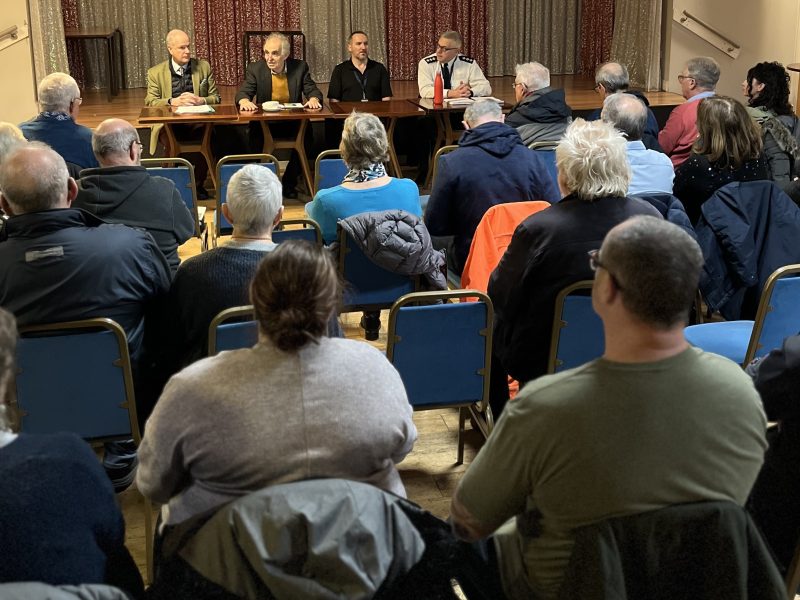SCARED, intimidated, angry and frustrated – these were the feelings expressed at a public meeting about antisocial behaviour and crime in Keynsham.
Residents spoke of problems that included:
* Drug-dealing on the Park Estate and in the Memorial Park.
* Cars regularly vandalised in Rock Road.
* Masked youths carrying weapons in the High Street.
* Shoplifting as a fact of life for town centre traders.
The meeting at the Royal British Legion Club was attended by about 50 people, the aim being to allow people to ask questions about policing in Keynsham.
Two leading police officers on the panel told residents that the town’s High Street is a top policing priority in the Bath district, with extra patrols laid on using officers from the whole area.
Other measures aimed at improving policing included extra officers for the region, an experienced new sergeant expected soon for Keynsham, and better 101 call-handling.
Chief Inspector Scott Hill, area commander for neighbourhood policing, said: “Antisocial behaviour is a blight and I don’t want it to continue. But I need the help of the community.”
Regarding drug-dealing in Keynsham, he said better intelligence is needed to tackle this as effectively in as in Bath, where police are out in plain clothes and have good links with the community.
But one resident said: “You’re not being proactive. You’re not even being reactive.”
And Councillor Alan Hale, a former policeman, received applause when he said: “There seems to be a total lack of visible policing in the town.”
He added that he had sat on the phone for an hour during a 101 call without response.
He said: “To try to contact the police is as bad as trying to get a doctor’s appointment.”
Most of the concern expressed at the meeting focused on the High Street.
A trader said he had sent the police clear CCTV images of two girls shoplifting but had been told the images were not good enough. This was “ridiculous”, he said, as the images were sufficient to allow his staff to recognise the girls when they returned on another occasion.
He said most of the shops in the street suffered from shoplifting but added: “We think there’s no point reporting it because nothing will happen.”
One resident said he had been confronted in the High Street and had seen the ‘Poundland flash mob’ who regular target the store.
He said it was youths aged about 16-17 who were causing the most trouble, wearing masks and some carrying weapons.
And a man who lives near the High Street expressed frustration at the police’s reaction at the meeting to what residents were telling them.
He said: “The response seems to be ‘we have a process in place.’ My ask to you is to put that area on some kind of code-red status so people see and feel a step-change in policing in the High Street. It needs to be more preventative, visible and effective. It feels reactive and business as usual.”
One woman said she was surprised to hear that the police were still trying to identity some of the trouble-makers.
She said: “Just go outside Poundland for a few days after school and you will see where they are. The parents don’t care. They are feral.”
The police said that youths were not committing an offence by covering their faces, even if it felt intimidating, and they could not be stopped and searched without strong justification.
Insp Jon Nash, deputy area commander, said he appreciated the public’s frustration but that the police response was circumscribed by the law.
He said the younger children causing trouble could be dealt with by youth services, talking to parents, and education – a long-term process to change behaviour and attitudes.
Meanwhile, town clerk Dawn Drury said town council activities for those aged 11 to 19 had been successful in engaging a number of young people.
Chief Insp Hill said of the additional patrols in the High Street: “It’s not fixed the problem but we do recognise it and we’ve put in extra resources. I know it’s not giving you the answers you want. I know you’d like patrols in the High Street all day, especially during the school holidays.”
Mark Shelford, Police and Crime Commissioner for Avon and Somerset, said the region has been recruiting 500 extra officers. CID, which used to be under-staffed by two-thirds, now has a full complement.
He admitted the 101 service is “terrible” but it had been adversely affected by a big rise in calls to 999, whose service he described as “very good.”
He said new technology coming in should improve the response to 101 calls.
Meanwhile, Insp Nash encouraged those who have trouble reporting incidents by calling 101 to use the anonymous Crimestoppers service, report online or contact their local neighbourhood officers via the Avon and Somerset police website, or attend beat surgeries. He also told people who witness a crime in progress to call 999.
A follow-up public meeting is likely to be held in about six months’ time.
Keynsham residents tell of antisocial behaviour blight


